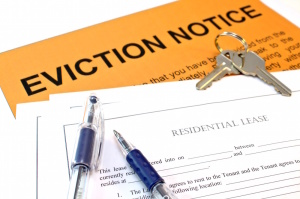California Landlord-Tenant Law: The Eviction Process
According to California landlord-tenant law, landlords have the right to evict a nonpaying tenant. However, renters also have rights under the law, and both parties should have an understanding of what is allowed and expected in an eviction.
First, landlords are not allowed to evict nonpaying tenants on their own, “without going to court AND getting a court order directing the tenant to move out.” 1 This applies to rental agreements made verbally or in writing.
To begin the eviction process, a landlord must provide the tenant with a three-day eviction notice, which gives the tenant three full days to pay the total rent due.
If the tenant does not pay the rent in full, or does so after the three days, then the landlord can move forward with the eviction process by securing an “unlawful detainer” from the court.
Once the nonpaying tenant receives the unlawful detainer, he or she must file a formal response with the court within five days. It the tenant fails to respond, then the landlord can file for a default judgment to regain possession of the property and for money owed. If the tenant responds, then the court will schedule a trial date and either rule in favor of the landlord or tenant. Landlords may want to consider having an eviction lawyer present in court.
Should the court decide the landlord has the right to evict a nonpaying tenant, then the tenant has five days to move out; otherwise, a sheriff can lock the tenant out of the property or personally escort them from the residence.
1 http://www.courts.ca.gov/selfhelp-eviction.htm
